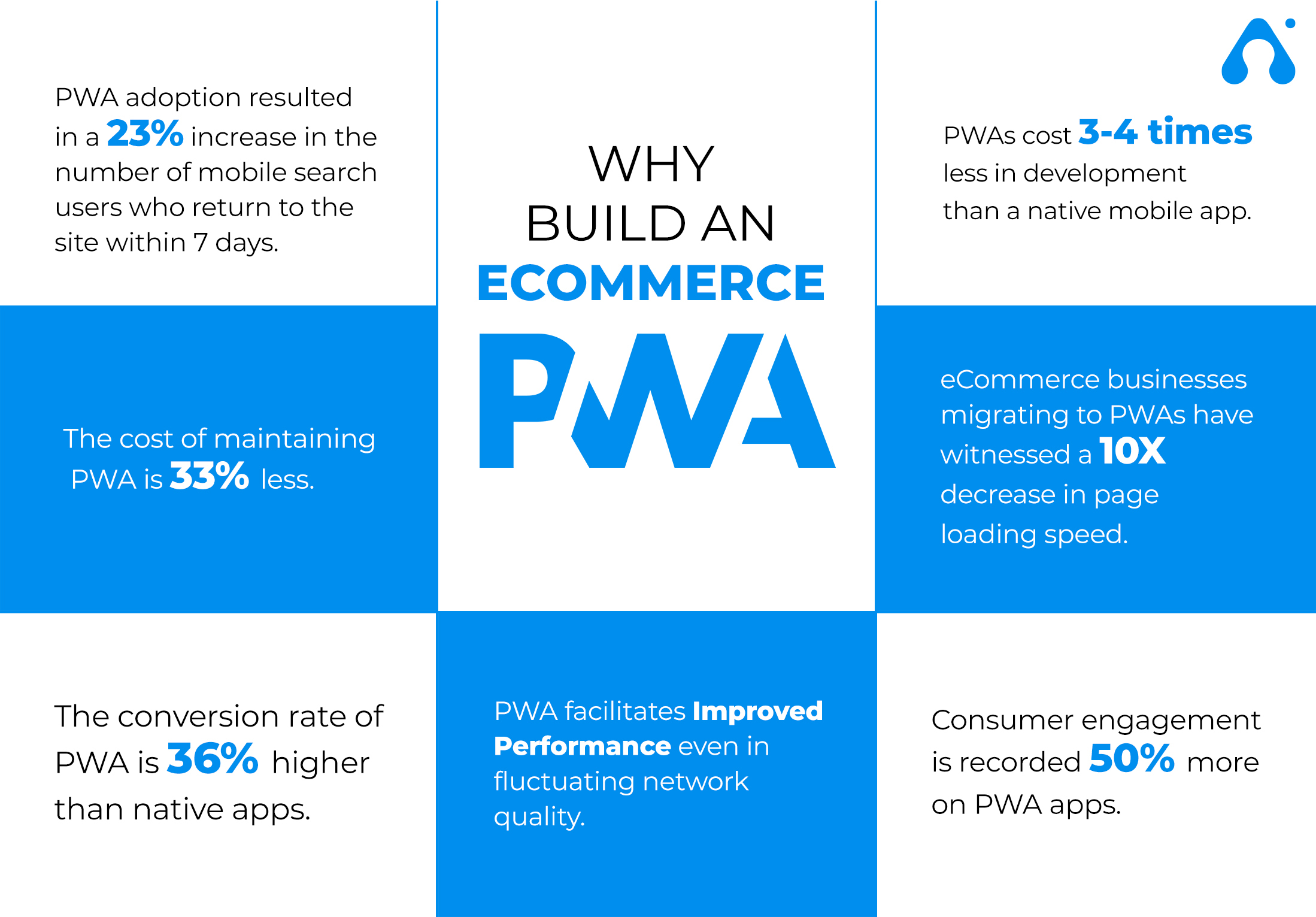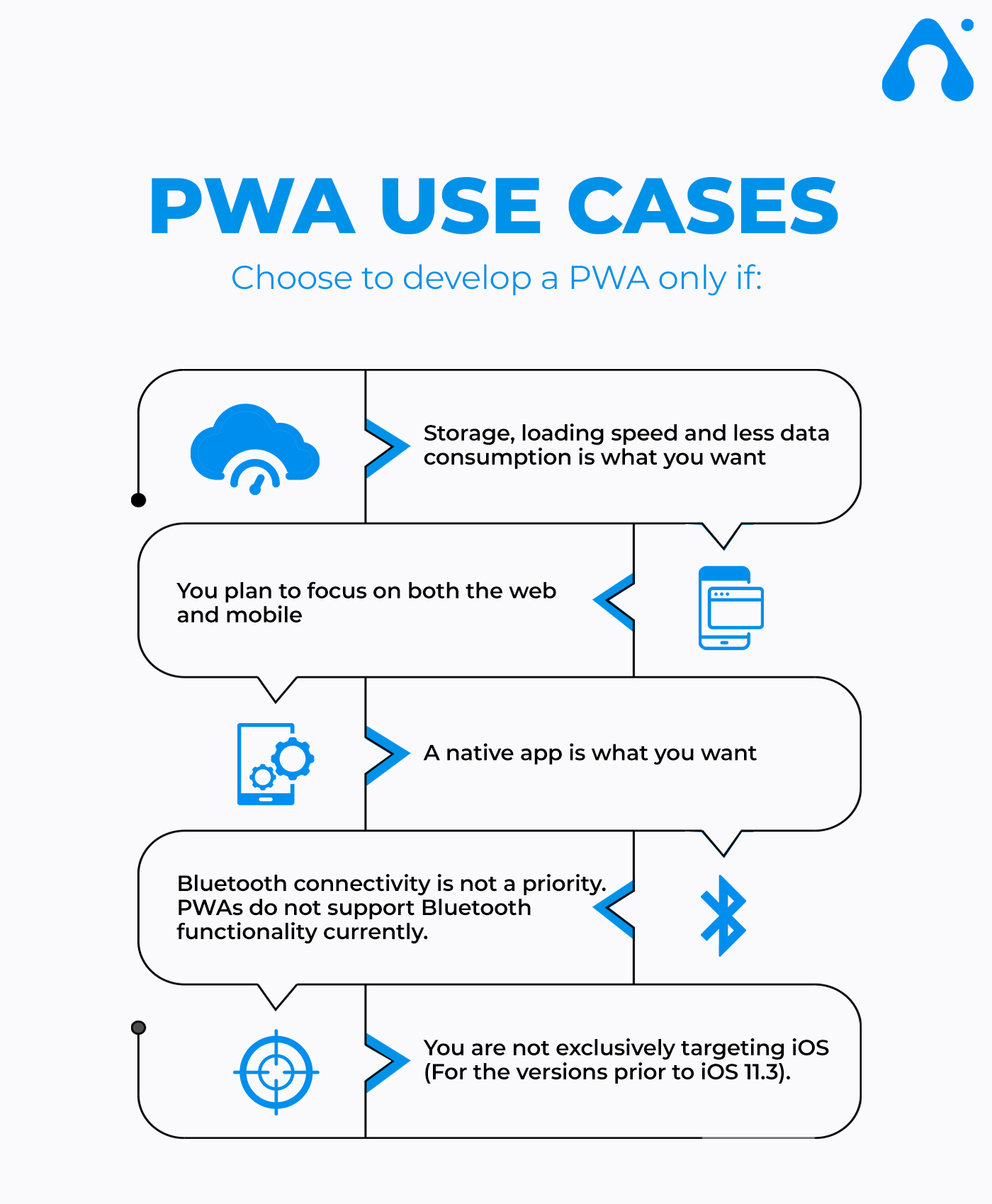I went online to buy a dress for my birthday. I clicked the URL and got redirected to the ABC.com site. The site loads and after a minute or two, content finally appears but with a fullscreen pop-up i.e. For a better shopping experience, download our mobile app. Gets redirected to the App store. But […]
Updated 24 January 2024

Director at Appventurez
I went online to buy a dress for my birthday.
I clicked the URL and got redirected to the ABC.com site.
The site loads and after a minute or two, content finally appears but with a fullscreen pop-up i.e. For a better shopping experience, download our mobile app.
Gets redirected to the App store. But so-so reviews, heavy size, blurred screenshots, poor navigation…
Got irritated and closed both the app store and the browser.
We bet you must have faced this familiar, unpleasant shopping experience at least once.
In the ever-evolving world of eCommerce, retailers are staying on their toes to keep up with leading-edge digital transformation technologies at breakneck speeds.
Given the tech advancement and emerging digital transformation trends, the way consumers shop has changed. Responding to the challenge, the benefits of PWA in eCommerce have branched out as a means of improving user experience, visitor engagement and increased conversion rates.

For eCommerce companies vying for glory, PWA or Progressive Web Application is one such promising technology that is helping retailers stay flexible, agile and highly responsive.
PWA has been a lucky charm for businessmen who are religiously following eCommerce trends in fulfilling the rising consumer expectations. Know everything you need to know about the benefits of PWA in eCommerce by jumping to the section of your choice.
For those with not even the foggiest idea, here’s a quick recap on what PWA is.
“Just websites that took all the right vitamins”
A progressive web app (PWA) is a website that behaves like a mobile app. It feels and looks exactly like a native app. You get the best of both worlds (mobile app development and web development) when switching to a progressive web app and deliver an app-like web experience your users will love.
Progressive Web Apps can be installed by anyone, anywhere and on any device with a single codebase.
For detailed insights, here’s everything you need to know about Progressive Web Applications.
To put it simply, Progressive web apps have been gaining attraction for all the right reasons. The image reflects why.
Now, let’s know the benefits progressive Web Applications bring to the table for eCommerce businesses.
User sessions on PWA sites are 78.25% longer than websites and apps.
PWAs have been successful in boosting customer engagement since 2015 in two ways. To begin with, the add-to-home-screen feature unlocks the opportunity for businesses to put their brand on the forefront (home screen) of their users. This makes it easy for customers to see and check your store as it becomes the very first thing they see as soon as they unlock their device. This enhances brand visibility and results in higher customer engagement.
Here are some time-tested strategies you should try to increase the app’s user engagement levels.
Secondarily, with progressive web apps for eCommerce sites, you can send timely push notifications to inform potential customers of special offers, discounts, new launches, etc. Besides, you don’t even need to know the email address of people to reach out to them.
According to Statista, ‘By 2022, the global mobile data traffic is expected to reach 77.5 exabytes per month worldwide at a compound annual growth rate of 46%.
Let’s face it – The majority of native apps stay immobile in our gadgets and are used hardly only once or twice and ultimately, deleted.
However, given the progressive web app future of providing the consumers with incredible eCommerce experiences, you get multiplied customer engagement. This is because customers are able to interact with the company in a way that was not possible before with native apps.
Alibaba saw a rise of 76% in its conversion rate after implementing the PWA model.
Progressive Web Applications are popularly known as revenue generating apps as they let potential customers find the desired product through their unique SEO-friendliness.
Google made mobile-first indexing the default option for all new web domains as of July 1, 2019. Mobile-first indexing prioritizes mobile-friendly websites and PWAs fulfill this condition.
Henceforth if you are scratching your heads to find effective ways for how to improve customer experience, especially for mobile device users, this is the right time to consider Progressive Web Apps for eCommerce.
As reported by AliExpress, ‘Having a PWA has improved its conversions for new users coming from all browsers by 104% and from users coming from iOS by 82%.’
One of the other reasons to choose PWA for eCommerce is that it improves customer experience and reduces bounce rates. Its three key factors are:
All of the listed benefits lead to higher levels of customer engagement and overall performance, increasing conversion rate and revenue growth.
Progressive web apps frameworks and architecture is built on the foundation of reusable codes so their developers can repeat them over and over again. This reduces the development time making it significantly shorter than is otherwise longer when creating a native app.
Given the advantage, the programmers can turn the regular website of your e-store into a PWA within a short stretch of time so that you don’t have to wait for ages to approach your desired audience.
The struggle between pwa vs native apps has been in existence for a long time now. Both PWAs and Native apps deliver an awesome customer experience on mobile. Retailers can use native apps to keep their loyal customers hooked, however, PWAs make it a lot easier to reach new customers.
It offers shorter development time, a strong SEO profile following best website practices and can be developed under a smaller budget.
This goes without saying that users are always looking for ways to reduce both their data and internet costs. The Progressive Web Apps for eCommerce acts like a blessing in disguise for customers. A progressive web app takes only a few MBs of memory, irrespective of an app that takes around 40MB or more.
To cut a long story short, progressive web applications are responsive, secure, easy to download, display powerful performance and wait – There’s more. They can even be used in offline mode.
So you see? PWAs are a real catch for your eCommerce business.
Now that you have a solid understanding of the benefits of PWA in eCommerce, let us explore how does PWA eCommerce platform spread its magic?
Ahead is how progressive web application works.
As already discussed, a PWA is a web page/website with all the benefits of an app. The users get a faster, highly reliable and engaging version of your website or eCommerce store.
Progressive Web Apps let users install the website in the form of an icon on the home screen of their smartphones which depends on how frequently they visit your website. Once users go to your website with the PWA, they are asked whether or not they wish to install the application on their smartphones.
You won’t find PWAs available on platforms like the App Store or Google Store. This means PWAs don’t need Google’s or Apple’s approval to crawl into users’ mobile.
One of the other benefits of PWA in eCommerce is that the businesses have the liberty to release updates whenever they feel like it, without going through the standard agreement processes.
According to Google, ‘More than half the users abandon sites when page loading time exceeds 3 seconds.’
PWAs have evolved as the ultimate option for eCommerce companies as they provide the best of both worlds by providing a native app-like experience but in a browser.
Many businesses have reported a powerful boost to their eCommerce after they released a PWA. Even tech giants such as Apple, Microsoft, Google and Adobe are already on board with progressive web apps to enhance the overall User Experience (UX) and attract as many users as possible.
Given the benefits of PWA in eCommerce, it is no wonder that these big leaguers are backing this prominent technology.
Here are some great PWA in eCommerce examples and how they used PWA to power their eCommerce mobile web:
Alibaba is the largest marketplace for suppliers, buyers and manufacturers all around the world. The biggest B2B China-based eCommerce platform released a native app but soon realised that its users were reluctant to install the app merely to complete a transaction (which they preferably do via a browser).
They soon took the assistance of a progressive web app development service to improvise their eCommerce solutions which immediately witnessed a significant increase in interaction rate up to 4X and a notable rise in the conversion rate by up to 76%.
The integration of features such as ‘Add to Home Screen’ and ‘Push Notifications’ helped customers re-engage with the website. The number of monthly users grew by 30% on Android and by 14% on iOS.
AliExpress is among the leading worldwide marketplaces that is owned by the Alibaba Group. The company found it difficult to deliver great performance on the mobile web and was struggling with user conversion.
Sensing the downfall, they moved to PWA and since then, the results have been truly amazing. After a major rewrite of their web app to a PWA, they witnessed:
Started as a book-selling e-store, Flipkart has full-fledged grown into the leading marketplace in India.
The eCommerce site found it difficult to provide a good user experience that was both fast and engaging to their mobile users. With around 63% of Flipkart lite users reaching the site via a 2G network, a quick and responsive user experience became the need of the hour.
Here are some unique UX techniques to follow in the year 2021 and beyond to augment the value of your app/product.
In view of this, the company sought a solution that would make the mobile web run instantly, work in offline mode and re-engage users. Therefore, they decided to leverage the benefits of PWA in eCommerce by switching to Flipkart Lite PWA.
As a result of the improvement in performance, Flipkart witnessed:
5 Miles is an online marketplace that bridges the gap between nearby sellers and buyers to trade things such as cars, household items, clothes, second-hand stuff and so on.
When the company suffered money earned through apps, low retention, high bounce rate and failed to deliver the much-needed user experience, it decided to go for a native app.
But this strategy turned out to be expensive as well as challenging. Inspired by the benefits of progressive web apps, they turned to the leading mobile app development company for progressive web app development services. They switched their website into a progressive app and started PWA for eCommerce use. And it was definitely worth it!
The PWA eCommerce platform offered powerful results:
These were some of the successful PWA eCommerce examples to get inspired from. Switching to a PWA eCommerce platform will definitely bring you much more than you invest in.
If you have decided that PWA development could be a great solution for your eCommerce business, here’s how Appventurez can assist you with the best available PWA solutions:
Developing PWA from scratch lets you devise a solution that is customised according to your business needs and requirements. Do note that the process will take a minimum of 2-3 months and require a detailed understanding of Magento and PWAs.
Our team at Appventurez has what it takes to create an excellent PWA – Deep technical knowledge and fluency in the latest mobile app development technologies.
PWA Studio was released in January 2019. PWA Studio doesn’t strictly offer a ready-to-use solution but a set of tools for building PWA stores.
With PWA Studio, businesses can build their own high-performance PWAs on top of Adobe Commerce. This has been a sure-shot way to increase user engagement, enhance conversion rates and diversify revenue streams.
Vue Storefront provides an open-source storefront solution under the MIT license. Its speciality is the ability to connect several eCommerce CMS or third-party software to the storefront through API (Application Programming Interface).
Please note that though such an approach offers a one-size-fits-all solution, the integration of an additional middle layer will cost extra maintenance resources.
There are several other PWA solutions as well that are worth mentioning like DEITY Falcon, Angular Storefront, Front Commerce and Spartacus.
All these PWA solutions use different architectures and have their own value proposition. When deciding the one for your business, be mindful of its features and price.
At Appventurez, we first analyze your idea to recommend you the solution that will work the best for you.
When should you build an eCommerce PWA? Despite the immense benefits of PWA in eCommerce, a progressive web app might not always be the right choice for your business.
You should switch to PWA if:

Convinced enough that PWA is the right choice for you? Get in touch with us. We will help you leverage the benefits of pwa in eCommerce to build your brand as the next household name.
Any moment presents an opportune time to leverage the advantages of Progressive Web Apps (PWAs) in eCommerce. The significance of PWAs in eCommerce development is on the rise, making them the optimal choice for providing a reliable and seamless mobile app experience to users.
Esteemed PWA development companies, such as Appventurez, boast years of extensive experience in delivering an interactive user experience akin to native apps, all without incurring exorbitant development expenses. By choosing Appventurez as your eCommerce app development company, you propel your online store into a digital exemplar, setting trends and ensuring a cutting-edge presence in the competitive landscape. Move forward confidently with the transformative assistance of Appventurez.


Elevate your journey and empower your choices with our insightful guidance.

Director at Appventurez
Director and one of the Co-founders at Appventurez, Chandrapal Singh has 10+ years of experience in iOS app development. He captains client coordination and product delivery management. He also prepares preemptive requisites and guides the team for any possible issues on a given project.
Posted : 9 August 2021
